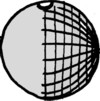h a l f b a k e r yRecalculations place it at 0.4999.
add, search, annotate, link, view, overview, recent, by name, random
news, help, about, links, report a problem
browse anonymously,
or get an account
and write.
register,
|
|
|
This is a basketball-sized, transparent globe standing on a 4 foot springy rod, and filled with water except for a bubble of air. The surface of the upper hemisphere is covered with circles the size of the bubble, each noted with the angle and severity of wind.
As it bows and bends in the wind, you
can see from a window or patio the air speed and direction. There is also a roof mounted model containing a drop of mercury.
 Bubble Ball Anemometer
[FarmerJohn,
Jun 16 2005]
Bubble Ball Anemometer
[FarmerJohn,
Jun 16 2005]
Wind wand
http://www.windwand.co.nz/ourwindwand.htm
More art than science (a sculpture designed by Len Lye), but you may find the similarities interesting. [Adze, Jun 15 2005]
[link]
|
| |
[FJ] I really wish I had more buns to give. I propose the Beaufort scale be renamed the FarmerJohn scale in your honour. |
|
| |
That's a lot of circles all overlapping each other. I wonder how readable this could be from an upstairs window. I guess the flexibility could be adjusted to spread them out a bit, but you still only have a limited space. Maybe needs to be medicine ball sized. |
|
| |
[edit]: what if you had concentric rings for wind speed, and left the direction to the whole contraption (pretty easy to tell in which direction it's bending)? |
|
| |
Not trying to deflate this in any way, mind you, just thinking about it. |
|
| |
I like the circles idea, but it will be hard to read from above. Also, the water will weigh the ball down, dampening its motion and slightly delaying the readings. However, the weight will also smooth the ball turbulatinos down, allowing for an easier read. |
|
| |
// smooth the ball turbulatinos // yeah, they were getting pretty rough... |
|
| |
[oxen crossing] I wasn't thinking of the circles overlapping but near to each other so that the bubble is always under or touching one. Concentric circles and radial lines (for wind direction) like a globe would also work. |
|
| |
With all that inertia, it’s going to be kinda bouncy, won’t it? |
|
| |
[lurch], you know of turbulatinos? Yes, they are rough sometimes. |
|
| |
Think latitude and longitute. The latitude would show wind speed. The longidude would show wind direction. |
|
| |
Alternative for checking wind direction: Put a compass in the device. Now, looking down from above, you will see north and you will see the bent rod. The bent rod literally points in the direction of wind speed, easily interpreted from the compass. |
|
| |
John, this is one I really wish you'd draw. (Added: nicely done, thanks!) |
|
| |
I guess all those tasks to achieve repeated accurate readings and smooth rod response: choice and testing of rod length and material, ball size and weight, line calibration and labeling, etc., might be included in the realm of baking the idea. |
|
| |
That sounds like the right solution. Just have to calibrate the lines for known wind speeds. Of course, the rigidity of the rod will change over time... might have to redraw the lines every 5 years or so, or buy a new rod, which that will have to be calibrated too. Nothing too cumbersome though. How will you go about getting official windspeed values? Surely you don't want to drag this thing into a windtunnel, that kills the simplicity. |
|
| |
Brilliant functional art concept, I love it! Much more engaging than the blown-glass barometer (which this brings to mind) I see in my Lee Valley catalogs. I think perhaps an hydraulic damper would smooth out the worst oscillations.
The largish size you specify would be a necessity: someone with eyes as bad as mine couldn't get very close to read it if it were smaller, and to approach would disturb the readings.
Bun! |
|
| |